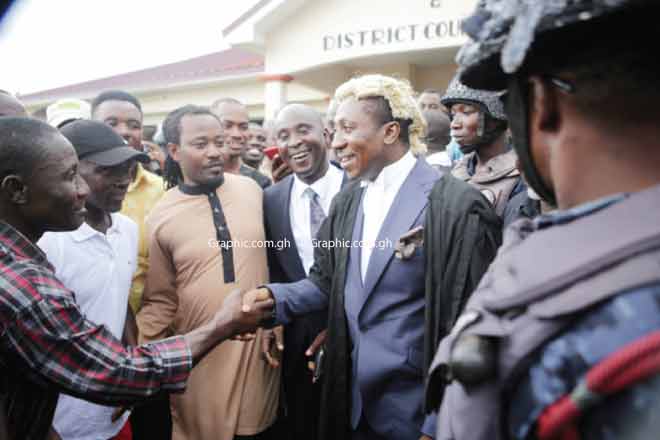
University of Education, Winneba reopens
The University of Education, Winneba (UEW) has reopened, three days after it was shut down by its management following a legal action challenging the legitimacy of its Governing Council (GC).
But the lecturers of the university have declared an indefinite strike until the final determination of the case.
The reopening of the university, which has since been confirmed on the UEW website, came about after the Winneba High Court Friday rebuked the university’s authorities for the closure after a ruling by the court last Tuesday.
According to the presiding judge, Mr Justice William Ato Mills Graves, the court never ordered the closure of the UEW, but rather placed an interlocutory injunction on the operations of the Vice Chancellor, Registrar and Director of Finance of the university pending the final determination of the law suit.
Mr Justice Mills Graves also chastised some media organisations for the false reportage and the university’s management for issuing a press statement which gave rise to speculations that the closure was in relation to the court ruling.
“When a court gives a ruling or makes a pronouncement and you do not understand, go to the court registry for a copy of the ruling or for the court proceedings in order not to create confusion,’’ he said.
The hearing yesterday attracted hundreds of students and staff of the UEW and many people from the community.
That led to a situation of more policemen being assigned to the court premises to provide security while patrons of the court were subjected to strenuous checks before they were allowed to enter the courtroom.
No work
Despite the reopening of the university, the President of the University Teachers Association of Ghana (UTAG), UEW branch, Dr Samuel Bekoe, told journalists that the lecturers would not go to work until the case was brought to a finality.
He described the legal action as a threat to the careers of the lecturers and a move which would invalidate the certificates of more than 65,000 graduates of the university.
“Members of UTAG will not work as long as this case continues. We feel that we are under attack and we have to protect our interest,’’ he said.
Background
The legal action against the UEW at the Winneba High Court was initiated in May 2017 by Mr Supi Kofi Kwayera, a former assembly member of Donkoryiem, a suburb of Winneba
Joined to the application as second respondent was the Minister of Education.
Mr Kwayera claimed that the tenure of the GC of the UEW elapsed in November 2013 after its members had served a two-year term twice.
According to him, the Ministry of Education failed to constitute a new Governing Council and allowed the “defunct” council to continue to operate, contrary to Section 8 of the University of Education, Winneba Act (ACT 672).
He also argued in his lawsuit that the GC appointed certain officers of the university such as the Vice Chancellor, Registrar and Finance Officer and also “approved Academic Board recommendations for the award of certificates and honorary degrees’’ although it had “no such mandate.’’
The applicant further claims that the council awarded “contracts to several companies to undertake projects without recourse to the Procurement Act 663’’.
He was, therefore, seeking reliefs such as a “declaration that the extension of the mandate of the Governing Council of the 1st respondent by the 2nd respondent to stay in office to perform such functions as a properly appointed council was in breach of Section 8 of Act 672 and a declaration that all decisions taken by the de facto body of persons who constituted themselves as Governing Council are null and void and of no effect.”
He prayed the court to order the refund of all amounts expended by the university for any contract which “sidestepped the dictates of the Procurement Act.’’
Dismiss case
At yesterday’s hearing, the legal team of the UEW moved a motion for the court to dismiss Mr Kwayera’s legal action.
Lawyer for the UEW, Mr Peter Zwennes, described the lawsuit as “incompetent’’ because, according to him, the High Court was not the appropriate forum for such an action.
The counsel explained that the applicant should rather have gone to the Supreme Court because he was seeking the enforcement of constitutional provisions.
He also argued that Mr Kwayera had no locus in initiating the action because he (Kwayera) had failed to demonstrate that he had any personal interest or he would suffer any personal injuries by any action of the UEW.
Lawyer for Mr Kweyera, Mr Alexander Afenyo Markin, opposing the application for dismissal, argued that his client was not in court because certain laws contravened the 1992 Constitution.
“We are in court to seek the court’s intervention for the enforcement of the Procurement Act, Act 663 and Section 8 of the University of Education, Winneba Act, Act 672,’’ he argued.
The court adjourned the case to July 10, 2017 to give a ruling on the UEW application for the case to be dismissed.
